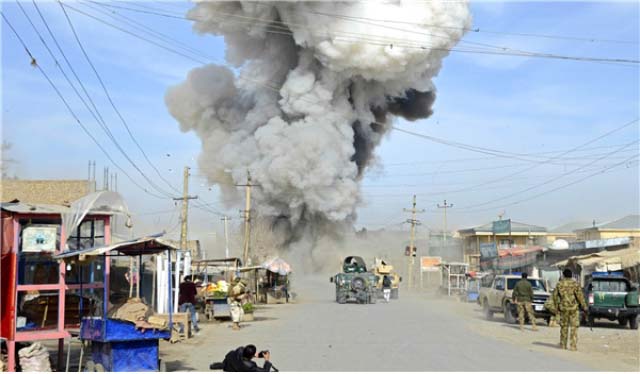With the declaration of spring offensive, the Taliban insurgents make heavy inroads into Afghanistan – which undermine the nascent democracy and sow the seeds of mistrust between state and nation. The graph of civilian casualties has increased dramatically. Similarly, the nation’s dream for a society void of violence and bloodshed did not come true. Hence, a large number of people leave the country, as a last resort, to flee war and political instability.
As a result, total civilian deaths and injuries in the first quarter of 2015 followed the record high levels of 2014. Between January 01 and March 31, UNAMA documented 1,810 civilian casualties, a two per cent decrease from the same period in 2014.
The election of new President in April 2014 had ushered in a lot of optimism among the people as well as the international community. It was hoped that Afghanistan would now move on to a path of peace and stability. But now, such hopes have faded away and Afghanistan seems to be going back to the quagmire of violence, as well as economic instability. According to a list compiled by a watchdog website Sadroz.af, Afghan President made 13 promises for the peace and security sector, 20 promises for the governance sector, and 29 promises for the socio-cultural sector. However, he had filled only 4 of the promises till date.
“The law and order situation of the country is a constant state of decline. The Taliban in the far flung areas of Farah, Kunduz and Badakhshan have already mounted a new spring offensive and are consolidating their positions in the areas that are far from Kabul. Insecurity has significantly increased throughout the country, civilian deaths have shot up, and the Afghan security forces are taking large, and potentially unsustainable, casualties. The Afghan forces also suffer from financial problems and deficiencies in logistics, intelligence resources, and special support functions, including medical evacuation.”
The security situation in the country is declining with each passing day. As a result, a large number of prisoners, mainly Taliban, escaped from two prisons within a month. Reportedly, more than 350 inmates have escaped after an attack by Afghan Taliban insurgents on the main prison in eastern Ghazni province. Similarly, the Taliban insurgents broke into the main prison in Kunduz city on Monday and freed more than six hundred prisoners; hours after militants captured Kunduz Province. Afghan MPs claim that three hundred Taliban fighters were among the released prisoners however security officials say that only one hundred and ten were members of the Taliban group.
Mullah Akhtar Mansour intensified deadly attacks from the first day of being appointed as Omar’s successor and declared peace process as “enemy propaganda”. The peace negotiation between Taliban and Afghan officials was stalled with the revelation of Omar’s death and Mansour wore the face of more radical character through launching heavy attacks to gain the support of opposing group. The rift between Omar’s family and Mullah Mansour, over his succession, was bridged in recent times. However, Mullah Mansour Dadullah, the Taliban’s commander, has not pledged allegiance to Akhtar Mansour and charged him as the yes-man of Pakistani Inter-Service Intelligence (ISI).
Moreover, Afghan officials also believe that Pakistan is still a safe haven for the Taliban insurgents and they organize their attacks there and cross the porous border to undermine the security situation. Speaking at the 70th United Nations General Assembly meeting in New York, Dr. Abdullah Abdullah, the Chief Executive Officer, said the Haqqani network had been identified as a main culprit and needed to be dismantled as had been Afghanistan demand in the past. “Our demands are legitimate as our people continue to suffer at the hands of terrorist elements who cross into Afghanistan and indiscriminately victimize our citizens. This matter needs can be addressed and facilitated by trusted international partners,” Abdullah is cited as saying. “We call on Pakistan to do what its leadership promised to us a few months ago when they agreed to crack down on known terror outfits – meaning the enemies of Afghanistan.” He also pointed out that hundreds of militants, including foreign fighters, organized attacks in Kunduz province, where heavy fighting is going on between US led security forces and Taliban. The attacks came a day after more than 10 spectators at a sport match were killed and many more injured in southeastern Paktika province in a bomb attack.
The Afghan-Pak relation soured when the Taliban insurgents carried out a fatal attack on Shah Shaheed Mosque in Kabul on August 7th which left dozens dead and wounded behind. Following the attack, Afghan President aired outspokenly as, “Pakistan still remains the venue and ground for gatherings from which mercenaries send us a message of war.” He added that at the time Pakistan President Nawaz Sharif said the enemies of Afghanistan are the enemies of Pakistan, “now the time has come for him to prove it.”
Despite all the blame game, Pakistani officials insist on resuming peace talk – which has been proved futile from the time of Karzai’s presidency until date. And I believe that it will never bear the desired fruit.
The unmitigated militancy, which leads to combatant and non-combatant casualties, makes a wall of mistrust between state and nation. Undergoing war and violence, a large number of Afghan people flee the country – this reflects the government’s failure and insufficiency. Ill-fatedly, our nation’s bleeding wounds seem to be festered despite the democratic system.

